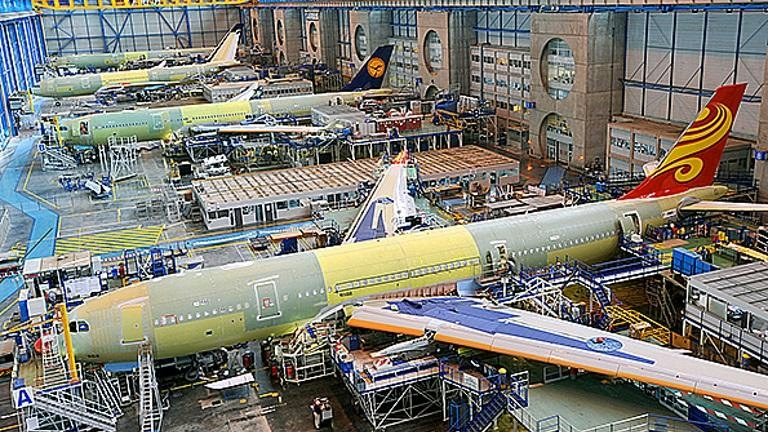AeroGenie — Your Intelligent Copilot.
Trending
Categories
Airbus Orders Rise Amid Global Demand Exceeding Capacity

Airbus Orders Rise Amid Global Demand Exceeding Capacity
Airbus concluded October 2025 with a total of 722 gross orders and 814 deliveries year-to-date, solidifying its position as the market leader amid surging demand that now surpasses its production capacity. The European aerospace giant continues to benefit from strong interest across both single-aisle and wide-body aircraft segments, as airlines and leasing companies compete to secure new jets despite ongoing supply chain challenges.
Narrow-Body Jets Propel Growth
Single-aisle aircraft remain the cornerstone of Airbus’s order book. Of the 722 orders recorded through October, 521 were for the A220 and A320neo families, representing more than 70% of total demand. The A321neo model has emerged as the most popular, highlighted by significant agreements such as VietJet’s commitment to 100 units and Abra Group’s 25-aircraft order, alongside substantial interest from undisclosed buyers. Airlines are increasingly prioritizing fuel-efficient, high-capacity narrow-body jets to optimize operating costs and reduce emissions, particularly as fleet replacement cycles accelerate.
Leasing companies have also expanded their share of orders in 2025, leveraging production slots that are fully booked well into the next decade. Lessors such as Avolon and Jackson Square Aviation are securing delivery positions to serve airlines that are unable to purchase directly from manufacturers, further tightening the delivery pipeline and underscoring the competitive dynamics within the market.
Wide-Body Demand and Long-Haul Recovery
While single-aisle jets dominate, Airbus’s wide-body portfolio remains robust. The A330neo family secured 90 orders, and the A350 program added 111 aircraft this year, together accounting for over a quarter of all new commitments in 2025. The A350, in particular, is gaining traction as the preferred aircraft for long-haul fleet renewal, especially across Asia and the Middle East. Notable transactions, such as Riyadh Air’s A350 order, reflect Saudi Arabia’s ambitions to establish a new global aviation hub. Meanwhile, ongoing fleet modernization efforts at Etihad Airways and Emirates demonstrate airlines’ continued willingness to invest in future capacity despite prevailing economic uncertainties.
Supply Chain Challenges and Emerging Competition
Airbus’s delivery performance, with 814 aircraft delivered so far in 2025, remains ahead of last year’s pace and supports the company’s plans to increase A320 family output to 75 jets per month by 2027 and A350 production to 12 per month by 2028. However, Airbus faces significant challenges in meeting its 2025 delivery target of approximately 820 aircraft, with a backlog of 30 jets currently awaiting engines. This bottleneck exemplifies broader supply chain disruptions that, according to the International Air Transport Association (IATA) and consulting firm Oliver Wyman, could cost airlines more than $11 billion in 2025 as global aviation demand continues to outstrip available capacity.
At the same time, new competition is emerging in the regional jet market. The collaboration between India’s Hindustan Aeronautics Limited and Russia to manufacture the Sukhoi Superjet-100 in India may introduce fresh challenges for both Airbus and Boeing, potentially reshaping the competitive landscape in key growth regions.
A Structural Imbalance Shaping the Industry
With Airbus’s backlog now extending well beyond 2030 and totaling 1,541 orders, the disparity between production capacity and demand is expected to persist. National strategies that link aviation expansion to tourism, logistics, and economic diversification continue to drive orders for the A350 and A320neo families. As the industry contends with supply chain constraints and the entrance of new competitors, this structural imbalance between demand and output is likely to define the trajectory of global aviation for the foreseeable future.

Factors Positioning Airbus for Leadership in 2026

Emirates Unveils Cabin Design for New Boeing 777X

Eighteen Years On, the Airbus A380 Remains Central to a $34 Billion Airline

How a boom in luxury airline seats is slowing down jet deliveries

Navitaire Outage Attributed to Planned Maintenance

Airbus Plans Record Delivery of 870 Aircraft in 2026

DigiYatra Debuts Outside Aviation at India AI Impact Summit

Vietnam Orders Strengthen Boeing’s Commercial Outlook

Airbus Signals Uncertainty Over Future A400M Orders

JobsOhio Awards $2 Million Grant to Hartzell Propeller for Innovation Center
